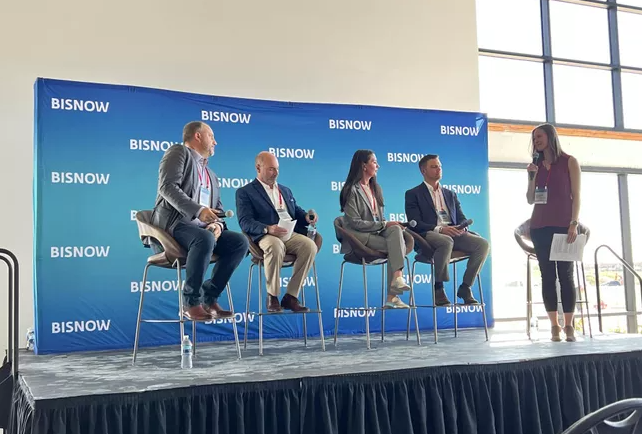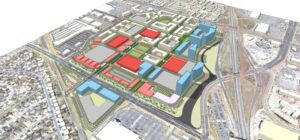Posted on: July 18, 2023
More than 10 years after the Westminster Mall’s closure, the city’s efforts to take the unusual step of acting as developer on the property’s reimagining is bearing fruit. With new retail openings, a hotel and hundreds of residences, the project began taking shape in earnest in the throes of the pandemic.
The Westminster Mall, a relic of the 1970s-era mall development boom, began to decline, in part because of the nearby opening of Broomfield’s Flatirons Mall in 2000. The Westminster Window reported in May that the mall’s sales tax collections declined from $7M to just over $750K. It also lost anchor tenants like the AMC movie theater, Macy’s and Dillards.

Bisnow/Robert Davis
Trimble’s Nate Vielher, Pathfinder Partners’ Lorne Polger, Colorado BioScience Association’s Emily Martini, BROE Real Estate’s Milan Gutesha and Stantec Architecture’s Shannon Jones.
Westminster elected officials wanted to develop the sagging mall into a walkable downtown, but couldn’t find the right developer, so they took matters into their own hands.
“We had a vision that the mall would sit and become successful. The only problem was that we couldn’t find a developer that saw our vision,” Mayor Nancy McNally said during Bisnow’s Future of Metro Denver’s Northwest Corridor event July 12 in one of the redevelopment’s vacant retail spaces.
So, local leaders put together a plan to redevelop the mall into a downtown area that includes about 2,300 residential housing units, and more than 1M SF of office and retail space, according to plans on urban design consulting firm Van Meter Williams Pollack’s website.
It wasn’t the first time the city has taken an active role in its commercial development. Years earlier, it took an ownership stake in the Promenade and Town Center projects, which include a 312-unit mixed-use development and the Orchard Town Center. That ownership stake helped Westminster raise the funds to purchase and develop the former Westminster Mall site, McNally said.
Marczyk Fine Foods founder and CEO Pete Marczyk said at the event he has “never worked with a city that became a development entity” quite like Westminster has. His company is in the process of turning a building in the city into the next Marczyk’s location.
 “Westminster is becoming a pretty good party for commercial real estate development,” Marczyk said.
“Westminster is becoming a pretty good party for commercial real estate development,” Marczyk said.
Other developers like Grand Peak Senior Vice President of Development Elli Lobach said Westminster’s active approach to commercial development is one reason why so many people seem to want to do business with the city. Lobach pointed out that Westminster was “very transparent” about its development fees and helped her firm identify infrastructure and sewer lines, two things with which Lobach said other cities are less forthcoming.
Westminster has seen significant growth over the last decade because it offers a cheaper cost of living than cities like Denver and Boulder. The median sales price for homes in Westminster was about $548K in June, according to Redfin, about 9% below the median sales price for Denver and 51% below Boulder’s median home price. The city’s median rent is also around $1.8K per month, which is about 5% cheaper than in Denver and about 21% cheaper than in Boulder.
Westminster also benefits from having major roads such as U.S. 36 and Sheridan Boulevard going through the city. U.S. 36 averages about 94,000 cars traveling on it per day while Sheridan Boulevard has around 36,000 cars per day, according to the Colorado Department of Transportation.
Despite the recent development successes in Westminster, experts say there are still several headwinds that need to be navigated in the city and elsewhere. Lobach pointed to insurance costs as one of the biggest impediments to future development. She said insurance costs have doubled for retail units, rising from around $600 per unit to nearly $1.2K per unit as local climate-related incidents like wildfires make insurance companies more weary of issuing coverage.
Lobach added that her firm has developed a new strategy to overcome these costs. Instead of holding all of the units under one “umbrella” policy, Lobach said her firm has started separating their newest units into their own policy, which has saved them approximately $300 per unit.
Commercial developers are also facing significant challenges from rising property taxes and high interest rates, Vertikal Collaborative Managing Partner Walker Thrash said. Many property owners received notices in May that showed their property taxes were increasing by between 30% and 50%, The Colorado Sun reported. Lawmakers have since introduced a legislative solution to the problem, although voters still need to approve it during the November elections.
Meanwhile, interest rates are likely to stay high until at least midway through 2025, Pathfinder Partners’ Lorne Polger said. Polger added that it seems likely that the Federal Reserve will raise interest rates by another 0.25 points during its next meeting as the central bank continues to fight stubborn inflation.
“It’s been tricky for a lot of people to deal with three headwinds all at once,” Lobach said.
Another challenge that lies ahead for Westminster is attracting new office projects, Thrash said. The city has attracted a lot of retail and hospitality developments, which Thrash said is illustrative of Westminster’s early stage development. He added that the market probably won’t see office developments until it is more “mature.”
One aspect that could change Westminster’s development course is getting an expanded light rail, Polger said. Westminster has a track that takes riders from Westminster Station to Union Station in downtown Denver, but Polger said additional light rail service could be a big boon for future development.
Westminster also has a strong life sciences market, Colorado BioScience Association Vice President Emily Martini said. She added that there could be “significant growth” between Westminster and Boulder over the next five to 10 years as cities such as Longmont, Lafayette and Frederick see increased demand for life sciences properties.
“Activity breeds activity,” Polger said.
Posted in: News